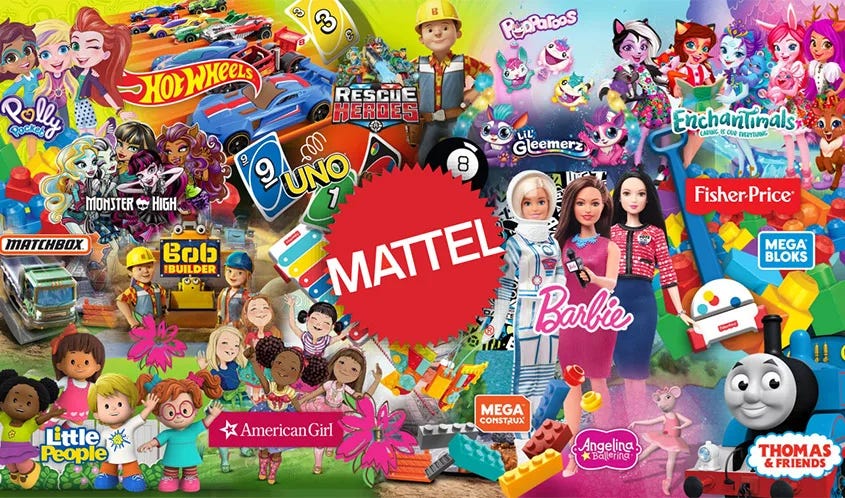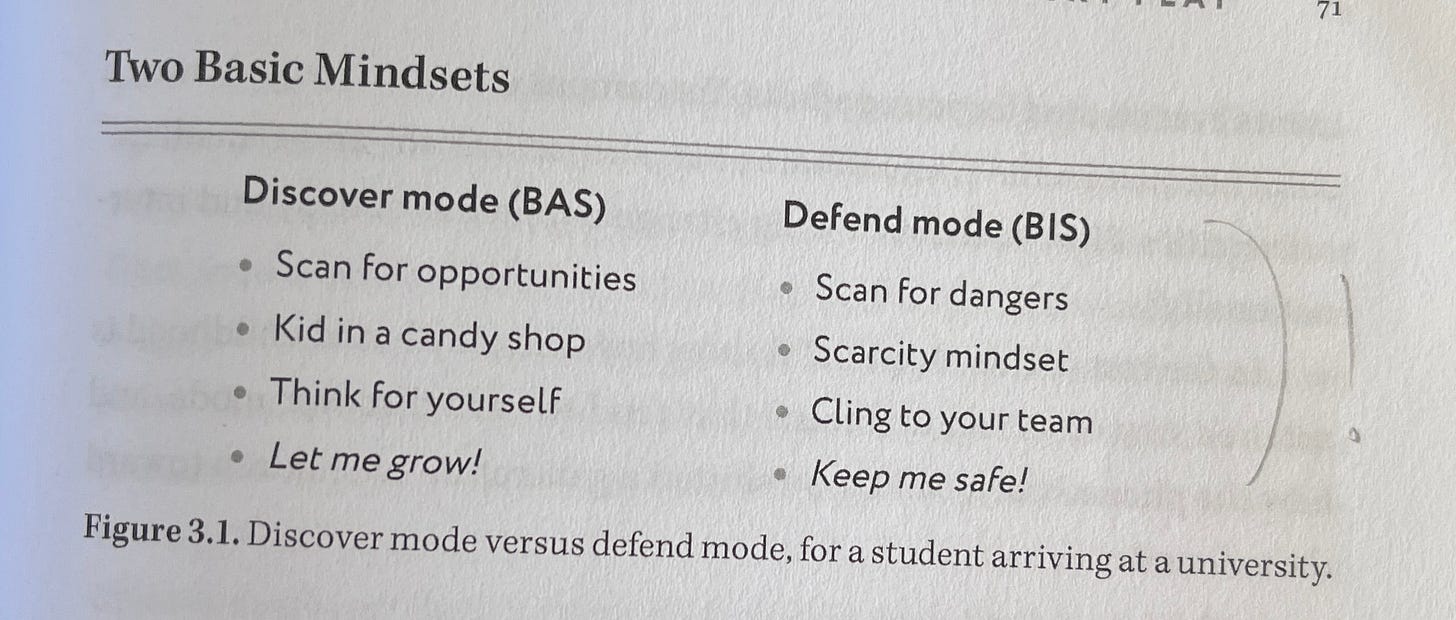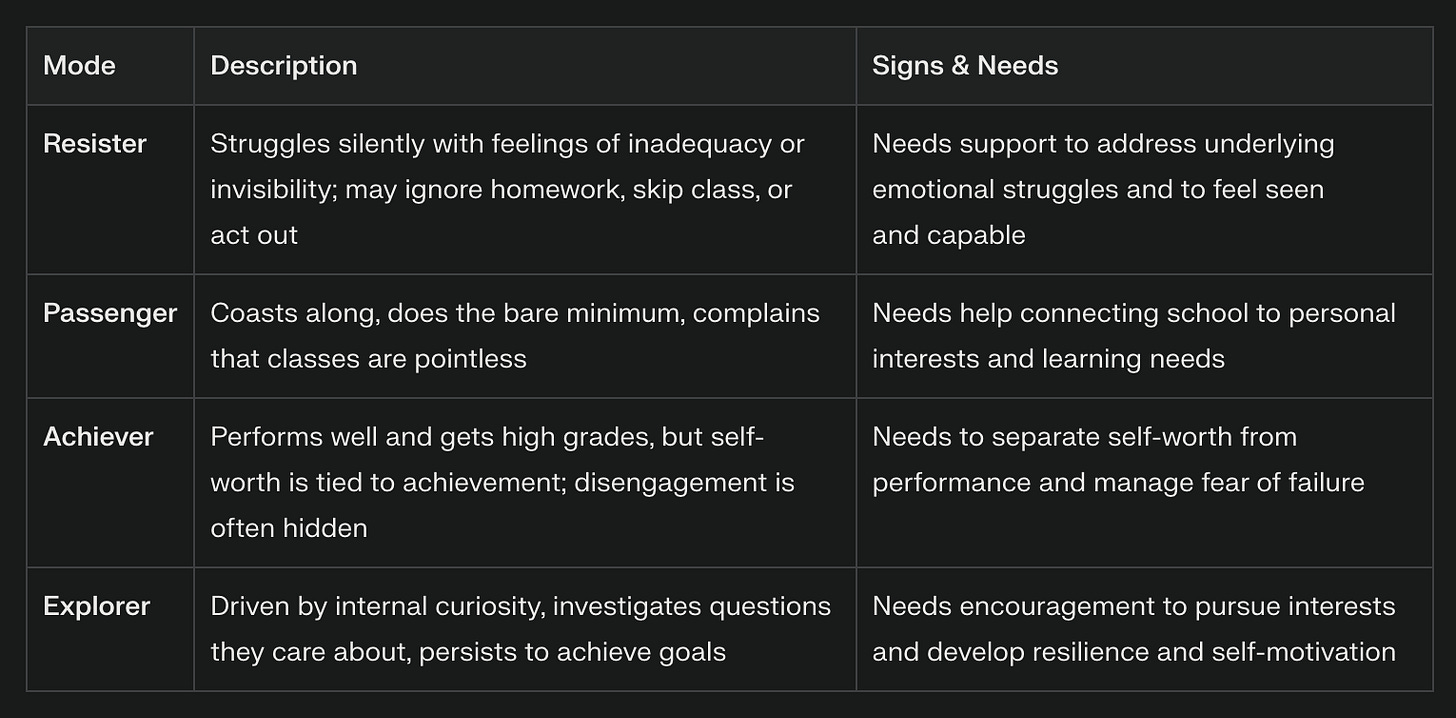discoveries #4
Mattel meets OpenAI • the anthropomorphic trap • more risky play • re-engaging teens, school and AI • "Your brain is safe. Your thinking, however, is up to you."
Hello parents and what not!
If you’re new here, welcome! NewKid is a podcast where I sit down with parents and talk about the singular choices we make raising our children today: what we would love to nurture, and how could technology serve us on this mission.
Interesting stuff from previous weeks:
hi Barbie, how was your day?
OpenAI recently announced a partnership with Mattel, its first ever with a toymaker. As you know, Mattel makes toys, a LOT of different toys, from Barbie dolls to Polly Pocket to Hot Wheels cars ;
The two expect to announce their first “AI-powered product” later this year, with the goal of enhancing “fan engagement in a safe, thoughtful, and responsible way.”
Well, well, I am certainly intrigued by this first iteration of “safe, thoughtful, and responsible” AI toys.
should robots be our kids’ best friends?
- or the anthropomorphism trap.
In a recent interview (in French) and in the episode below (in English), neuroscientist Dr. Mathilde Cerioli, who studies the intersection of child development and artificial intelligence, reminds us that early and frequent interactions with AI-powered or anthropomorphic technologies (like conversational toys) can distort children’s understanding of attachment and trust, especially at a young age.
Imagine your 4 y/o getting used to playing with an AI toy that sounds just like you (your voice)… just more… perfect : always patient, never angry or tired. How does it feel? What will your child learn about social interactions?
Teenagers brain development is also critical. They are going through a neurologic crisis: their reward system (called limbic system) is incredibly sensitive WHILE their control system, the front part of the brain (the frontal cortex) has yet to develop, until 25 y/o. They’re going through an intense emotional shift as they need to connect with other people than their parents, learn social anxiety, how to adjust… in a world where anything can be recorded - which makes this phase even more stressful.
Getting immediate rewards without thinking of the consequences and not fearing any judgment = no wonder why AI chatbots are so appealing to teenagers.
Parents 👇
Share with them what we do on our phones ; share them how much we struggle, too ;
We have to become role models ; think about this, called technoference: 80% of teens report feeling lonely with their parents because of how much they’re on their phones. 80% ;
Delay as much as you can the use of AI tools for children ;
When children do ask to use AI, develop literacy ; for instance teach them how to not ask an AI one answer but multiple ones (having a choice!) ;
Last but not least : what you do outside of any digital world matters as much as what you do when you’re engaging online !! So get out there, connect and play. (Yeah, you too, parent)
At school 👇
We need to fall in love with the learning process, not just the result. Kids do that naturally. Until they understand how the grading system works. AI might be the opportunity to rethink about education.
If school keeps praising for results only (todays’s reward), AI will do - does already - a better job.
So! How do we encourage kids to love the process (again), how do we encourage them to dig into what excites them? Because, and I so much agree, these, are the teachers you will remember your whole life!
AI x school 👇
connect, first! Show that you care (“tell me about this”: process - instead of just a “good job”: result)
imagine a new grading system, for instance a role-play discussion panel (yep children could use AI to prep but they’d run the show IRL, on their own)
bring on AI literacy ; how to prompt (the more you use AI the more you should be able to use it properly ; “show me your prompts”…)
Are you a parent in San Francisco?
I’ll be there the whole month 👋 let’s meet!
risky play, please
Following this interview, I have been reading The Anxious Generation from Jonathan Haidt. I am finding it particularly helpful to understand the context in which GenZ grew up as teens, and what we could (= absolutely must) do better for the coming generations. One thing that stands out is the absolute need for kids to have outside free play, A LOT of free play. Meaning no adult supervision ;
“keep them as safe as necessary, not as safe as possible” - Mariana Brussoni
Kids naturally seek out risky play: “thrilling and exciting forms of play that involve a risk of physical injury”.
They are in need to “master their fears. As they do so, their fears turn into thrill and triumph”. How would you take that from them, uh? (Mathilde I am talking to you). Usually risky plays fall into six different forms:
heights (eg climbing)
high speed (eg swinging, fast slides,..)
dangerous tools (eg hammers and drills)
dangerous elements (eg experiment with fire)
rough-and-tumble play (eg wrestling)
and the least fun of all : disappearing
Only in such environments will they be able to develop their social and emotional skills, go full speed on the discover mode, an abundance mindset and thus a healthier life.
And nope, free play does not apply online, where small mistakes can have huge consequences:
Children did not evolve to handle the virality, anonymity, instability, and potential for large-scale public shaming of the virtual world.
re-engaging teens : AI x school
In this episode, Ezra Klein & Rebecca Winthrop , co-author of The Disengaged Teen, discuss about the future of education, especially in schools.
She emphasises on how the teacher’s mission is “damn near impossible”, since they have to, altogether:
master certain subject
do class for kids with different grade levels
manage a classroom dynamic
be social workers
be relationship managers
One of these hats could be taken by an AI tutor, but since “we don’t understand AI at all”, there’s inevitably going to have years trying.
The years 2010-2015, or the Great Rewiring - a term used by Jonathan Haidt to describe the transition from the play-based childhood to the phone-based childhood - were a massive uncontrolled experiment where children were the guinea pigs.
Here’s how to avoid taking that path again with AI, according to her:
Do not use AGI unless you know what you’re using it for, aka there’s a real problem to solve ; don’t get trapped in the FOMO (as a parent, an educator)
Do give AI to the adults in the school building ; help them figure out how it will help them today ; then give it to school leader to work on ideas to implement
Any company that wants to work with kids and school should be a benefit corporation (= a type of for-profit corporate entity that, in addition to seeking profit, is legally required to pursue a material positive impact on society and the environment)
Build AI literacy at school when kids get older = what is this? How is it made? Risks and benefits? Ethics?
Gouvernement should step in to regulate ; labs are racing to get allegiance of young kids and it’s terrible because these products are not designed for young kids ; AI Labs should create AI product designed for kids, which means not as seductive. Ultimately you want the kids to be fluent in the new technology without being seduced by it.
Open questions
At a time when AI is entering schools, should schools resist and become the place to retreat? The place to learn how to become as human as possible? The place where you’d be reading the great books and thinking about them, writing long essays,… well, developing specific human faculties?
Shouldn’t we do anything we can to ensure kids are developing the following muscles : reflection and meaning making?
Schools are not designed to give kids agency, they’re designed to make kids comply. Hence the importance of asking ourselves this question : is my kid developing agency (rather than grades and behaviours)? This, is probably becoming the next core skill.
How do I make sure my kids are learning to interact with other human beings? What moments to I engineer, what spaces do I give them?
Listening and speaking - oracy skills - will be paramount in an AI world ; what can I do to prepare them for this?
will AI damage our brains?
A very interesting answer to this question, by Ethan Mollick, a professor at the Wharton School of the University of Pennsylvania “I study entrepreneurship & innovation and AI. I am trying to understand what our new AI-haunted era means for work and education”. - thanks Margaux Pelen for sharing this piece!
The problem is not just cheating, though AI certainly makes that easier. The problem is that even honest attempts to use AI for help can backfire because the default mode of AI is to do the work for you, not with you.
(…)
Ultimately, it is how you use AI, rather than use of AI at all, that determines whether it helps or hurts your brain when learning. Moving away from asking the AI to help you with homework to helping you learn as a tutor is a useful step.
Unfortunately, the default version of most AI models wants to give you the answer, rather than tutor you on a topic, so you might want to use a specialized prompt. While no one has developed the perfect tutor prompt, we have one that has been used in some education studies, and which may be useful to you and you can find more in the Wharton Generative AI Lab prompt library. Feel free to modify it (it is licensed under Creative Commons).
If you are a parent, you can also act as the tutor yourself, prompting the AI “explain the answer to this question in a way I can teach my child, who is in X grade.”
(…) while AI is more creative than most individuals, it lacks the diversity that comes from multiple perspectives.
Always generate your own ideas before turning to AI. Write them down, no matter how rough. Just as group brainstorming works best when people think individually first, you need to capture your unique perspective before AI's suggestions can anchor you. Then use AI to push ideas further: “Combine ideas #3 and #7 in an extreme way,” “Even more extreme,” “Give me 10 more ideas like #42,” “User superheroes as inspiration to make the idea even more interesting.”
(…)
Our fear of AI “damaging our brains” is actually a fear of our own laziness. The technology offers an easy out from the hard work of thinking, and we worry we'll take it. We should worry. But we should also remember that we have a choice.
Your brain is safe. Your thinking, however, is up to you.
That’s all for today!
As always, I am happy to keep chatting in the comments, notes or messages ; don’t be a stranger 😎
Mathilde




